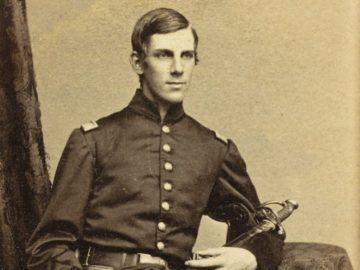Lincoln Caplan in Harvard Magazine:
 IN THE SPRING of 1864, Oliver Wendell Holmes Jr. was fighting in the Civil War as a Union Army captain. He had enlisted three years earlier, soon after the war began, when he was 20 and in his last term at Harvard College, in the class of 1861. As an infantry officer in Virginia, he had received a near-fatal wound at Ball’s Bluff in his first battle, where he was shot through the chest in a Union raid that backfired. He had proved his valor by rejoining his men after he was shot, defying an order to have his wound tended. At Antietam a year later, where he was briefly left for dead on the bloodiest day in U.S. Army history, a bullet ripped through his neck. At Chancellorsville, in another eight months, an iron ball from cannon shot badly wounded him in the heel. Near there in winter, “Holmes lay in the hospital tent too weak even to stand as he suffered the agonies of bloody diarrhea,” Stephen Budiansky, M.S. ’79, writes in a new biography of Holmes: “The disease killed more men than enemy bullets over the course of the Civil War.”
IN THE SPRING of 1864, Oliver Wendell Holmes Jr. was fighting in the Civil War as a Union Army captain. He had enlisted three years earlier, soon after the war began, when he was 20 and in his last term at Harvard College, in the class of 1861. As an infantry officer in Virginia, he had received a near-fatal wound at Ball’s Bluff in his first battle, where he was shot through the chest in a Union raid that backfired. He had proved his valor by rejoining his men after he was shot, defying an order to have his wound tended. At Antietam a year later, where he was briefly left for dead on the bloodiest day in U.S. Army history, a bullet ripped through his neck. At Chancellorsville, in another eight months, an iron ball from cannon shot badly wounded him in the heel. Near there in winter, “Holmes lay in the hospital tent too weak even to stand as he suffered the agonies of bloody diarrhea,” Stephen Budiansky, M.S. ’79, writes in a new biography of Holmes: “The disease killed more men than enemy bullets over the course of the Civil War.”
That spring, generals Ulysses S. Grant and Robert E. Lee met on the battlefield for the first time. Grant, the newly appointed commander of the Union Army, had shifted its main target from Richmond, the capital of the Confederacy, to Lee and his roving Army of Northern Virginia. The Battle of the Wilderness was the opening fight. In fierce encounters over two days, of 119,000 Union soldiers, one of seven died or was injured; one-sixth of Lee’s 65,000 troops were casualties. Holmes filled a new role as an officer on horseback in the Wilderness. As Budiansky recounts, he faced “the most intense and nightmarish episode of the entire war for him, nine weeks of nonstop moving, fighting, and killing that would often find him falling asleep in the saddle from sheer fatigue, escaping death by inches, and witnessing carnage on a close-up scale that eclipsed even his own previous experiences.”
It is impossible to imagine a current Supreme Court justice being forged in such circumstances—with the survival of the nation, as well as of the multitudes fighting, so uncertain.
More here.
